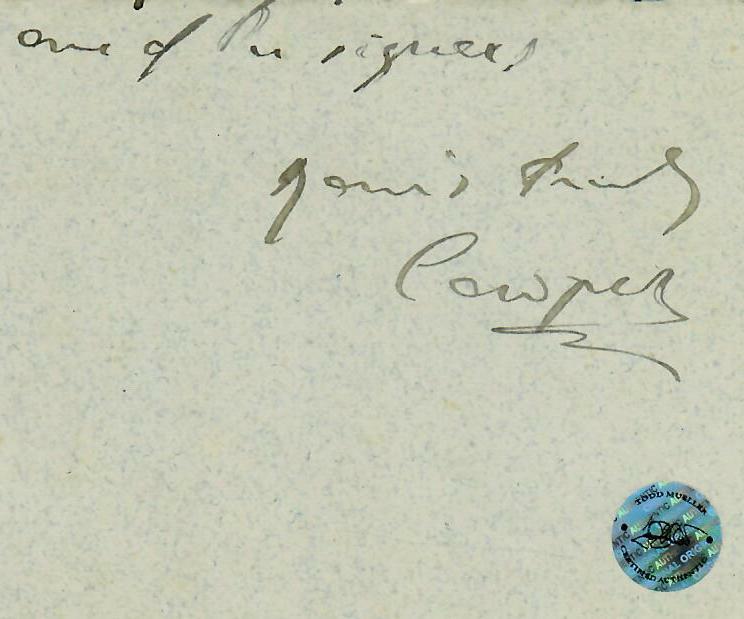When you click on links to various merchants on this site and make a purchase, this can result in this site earning a commission. Affiliate programs and affiliations include, but are not limited to, the eBay Partner Network.
Up for sale a RARE! "1st Earl Cowper" William Cowper Clipped Signature.
ES-5154
William Cowper, 1st Earl Cowper, PC, KC, FRS (c. 1665 – 10 October 1723) was an English politician who became the first Lord High Chancellor of Great Britain. Cowper was the son of Sir William Cowper, 2nd Baronet, of Ratling Court, Kent, a Whig member of parliament of some mark in the two last Stuart reigns. Cowper was educated at St Albans School in Hertfordshire, and was later to acquire a country estate in the county and represent the county town in Parliament. He was admitted to Middle Temple on 18 March 1681/82, was called to the bar on 25 May 1688, and built up a large practice. He gave his allegiance to the Prince of Orange on his landing in England in 1688, and was made King's Counsel and recorder of Colchester in 1694. Cowper had the reputation of being one of the most effective parliamentary orators of his generation. He lost his seat in parliament in 1702 owing to the unpopularity caused by the trial of his brother Spencer Cowper on a charge of murder. On 11 October 1705 he was sworn to the Privy Council,[2] was appointed Lord Keeper of the Great Seal, and took his seat on the woolsack without a peerage. In the following year he conducted the negotiations between the English and Scottish commissioners for arranging the union with Scotland. In November of that year he succeeded to his father's baronetcy, and on 14 December 1706 he was raised to the peerage as Baron Cowper of Wingham, Kent. He was the youngest Lord Keeper for many years: the Queen, who had taken a great liking to him, joked that "she had given the Seals to a boy" and suggested that in future he wear a wig to lend him gravity. When the union with Scotland came into operation in May 1707 the Queen in Council named Cowper Lord High Chancellor of Great Britain, he being the first to hold this office. He presided at the trial of Dr Sacheverell in 1710, but resigned the seal when Harley and Bolingbroke took office in the same year. Queen Anne, who had a high regard for him, "begged him with tears in her eyes" not to resign, and though she was reluctantly persuaded to accept his resignation, continued to consult him unofficially for the remainder of her reign. On the death of Queen Anne, George I appointed Cowper one of the Lords Justice for governing the country during the king's absence, and a few weeks later he again became Lord Chancellor. A paper which Cowper drew up for the guidance of the new king on constitutional matters, entitled An Impartial History of Parties, marks the advance of English opinion towards party government in the modern sense. It was published by Lord Campbell in his Lives of the Lord Chancellors. Cowper supported the impeachment of Lord Oxford for high treason in 1715, and in 1716 presided as Lord High Steward at the trials of the peers charged with complicity in the Jacobite rising, his sentences on whom have been censured as unnecessarily severe. He warmly supported the Septennial Bill in the same year. On 18 March 1718 he was created Viscount Fordwich and Earl Cowper, and a month later he resigned office on the plea of ill-health, but probably in reality because George I accused him of espousing the Prince of Wales's side in the prince's quarrel with the king. Taking the lead against his former colleagues, Cowper opposed the proposed Peerage Bill brought forward in 1719 to limit the number of peers, and also opposed the bill of attainder against Atterbury in 1723. Cowper was not a great lawyer, but Burnet says that he managed the Court of Chancery with impartial justice and great despatch; the most eminent of his contemporaries agreed in extolling his oratory and his virtues. It is notable that Queen Anne, despite her prejudice against the Whigs in general, came to have a great respect and liking for Cowper, and continued to seek his advice even after he left office as Lord Chancellor. His younger brother, Spencer Cowper (1669–1728), was tried for the murder of Sarah Stout in 1699, but was acquitted; the lady, who had allegedly fallen in love with Cowper, having committed suicide on account of his inattention—at least according to Cowper's lawyers. Spencer was one of the managers of the impeachment of Henry Sacheverell, was Attorney-General to the Prince of Wales (1714), Chief Justice of Chester (1717), and Judge of the Common Pleas (1727). He was great uncle of William Cowper, the poet.











